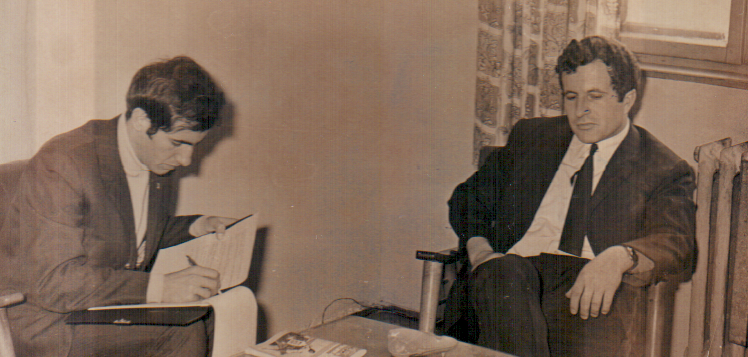1968 yılında Priştine’de Hukuk fakültesine yazıldım, birkaç ay sonra 1969 Nisan ayında Priştine’de Tan gazdetesi çıkmaya başladı ve beni bu gazeteye davet ettiler. Aslında bir duyuru, konkur yayınlandı, ben o konkura katıldım ve kabul edildim. Öyleki Tan’nın birinci sayısını hazırlamaya başladık. Priştine’den Safet Breka vardı, Enver Baki vardı… Prizren’den ben vardım, benim arkadaşım yine öğretmen okulunu bitiren, o da şairdir şiir yazar şimdi Priştine’de yaşıyor Bayram İbrahim vardı. Mitrovica’dan Müberra Tuna vardı. Ve biz dört beş kişi işte Tan’nın çıkması ile ilgili yetkili devlet organları karar almış, biz şimdi ilk sayıyı hazırlamaya başladık.
Hatırlıyorum bir yer Tan’a vermişler, bomboş bir yer. Oraya bir kamyonla iki masa geldi ve onları biyerlere koyduk. Daktilo yok, çünkü Türkçe’nin biliyorsunuz harfleri şey var, ö ü, farklı harflerdir. Daktilo yok, Tan’nın müdürü Süleyman Brina’nın bir daktilosu vardı o getirdi, bir de Süreyya Yusuf’un o Tan’nın açılmasında bir daktilosu vardı. […] 1 Nisan’dan 1 Mayıs’a kadar hazırlıkları yaptıktan sonra Tan’nın birinci sayısı çıktı. Birinci sayısının yine baş sayfasına benim yazım var.
İskender Muzbeg 1947 yılında Prizren’de doğdu. 1974 yılında Priştine Üniversitesi Hukuk Fakültesi’nden mezun oldu. Öğrenimi sırasında 1969 yılında Tan gazetesinde çalışmaya başladı. Baro sınavını geçtikten sonra Sayın Muzbeg Prizren Belediyesi’nde kamu avukatı olarak çalışmaya başladı. Savaştan sonra 1999 yılında İnsani Hukuk Merkezi – Prizren şubesi ile işbirliği yaptı. Şu anda Sn. Muzbeg bağımsız bir avukat olarak çalışmakta ve ailesiyle birlikte Prizren’de yaşamaktadır.
